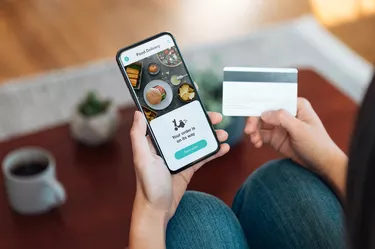
CVV stands for card verification value, explains IDFC First Bank, and it is used as an extra security measure on credit and debit cards. It's similar to a card verification code (CVC). Major debit card issuers, including Visa, Discover and Mastercard, use three-digit CVV numbers, while American Express uses four digits on its prepaid debit cards. The card companies use different names for these security codes. Mastercard has the CVC2, Visa has the CVV2 and American Express has a CID.
The Purpose of the Code
Video of the Day
The CVV code provides a special layer of security for your debit card when you use it remotely, such as for online purchases or over the phone. This is important because debit cards have less protection against fraud than credit cards, according to the Federal Trade Commission.
Video of the Day
Except for when you use prepaid cards, the money comes straight out of the cardholder's bank account with a debit card. There's no float, which is the time between writing a paper check and when it hits and debits your account.
Location of the Code
Most debit cards, including Visa and Mastercard, show the three-digit number on the back of the card in the signature area. The security code follows the debit account number or is the last four digits.
If you have an American Express card, the CVV won't be on the back of your card. Instead, the CVV number is a card security code called a CID that appears on the front of the card for American Express prepaid debit cards. It's printed to the left or right of the embossed account number. Although most debit cards contain a CVV code, not all have this security feature.
How It Works
Cardholders are typically asked to provide both the debit card account number and the CVV code when making purchases by internet or telephone. The number proves you actually possess the card and prevents others from fraudulently providing your card number if they don't physically have the card.
Don't ever give out your CVV or similar security number if someone requests it in person; they shouldn't need it. Some scams or phishing attempts try to get your debit card number, credit card information, expiration date and CVV code so they can steal or sell your information.
If anyone tries to use your card without providing the code, the transaction is cancelled. When you give the CVV, the merchant verifies it before authorizing your purchase. It's illegal for merchants to save the CVV codes, so your card remains secure for future use.
It's Not a PIN
A personal identification number (PIN) is a security code for in-store purchases and automated teller machine transactions, while the CVV is for remote use. You provide the PIN, not the CVV, to withdraw cash or make transfers from an ATM. Typically, a PIN is a four-digit number. Some debit cards require a signature rather than a personal identification number for in-store purchases, and some cards provide a choice of either.
PIN-based debit cards are more secure than signature cards. In any case, don't give out your PIN number by mistake for internet or phone purchases.
Signature Strips for Security
Another important way to keep yourself safe from scams and phishing is to sign the signature strip or signature box on the back of your card. If someone tries to use the card in person and cannot match your signature, they may be unable to use it as a payment card. Thieves often try to get a cash advance or cash back from debit cards and credit cards, as they can then spend the money, and it will be harder to trace.
Unfortunately, if someone obtains your card, the signature won't matter for online payments. Call your credit card company immediately and ask it to cancel the lost card.